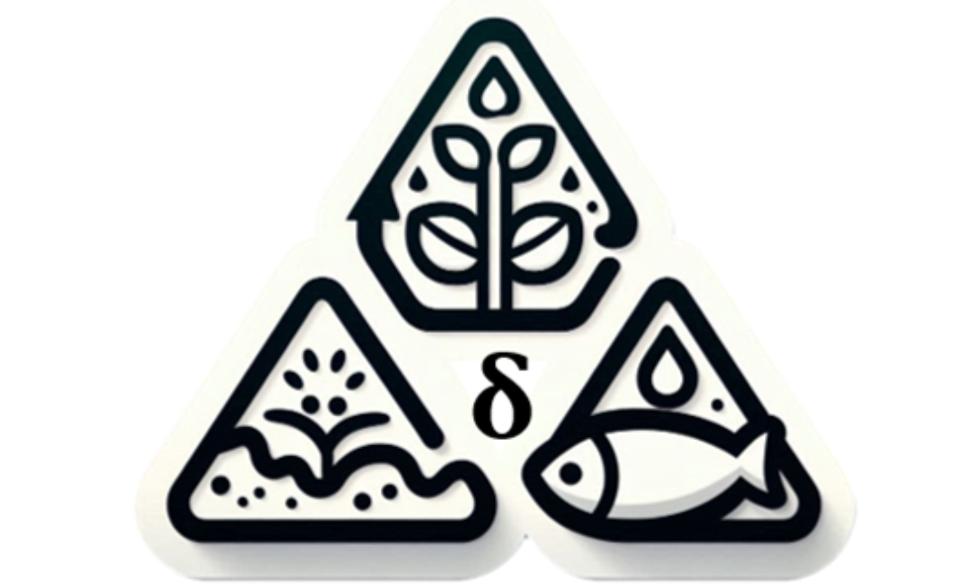-
Date:
From 17 Nov 2025 until 21 Nov 2025
-
Deadline for Applications:
17 Oct 2025
-
Location:
Faculdade de Ciências da Universidade de Lisboa, Campo Grande 1749-016 Lisboa
-
Duration:
36 hours (contact hours): Intensive 5-day course, seminars + field sampling + lab classes.
-
Schedule:
9h-17h30
-
Lecturer or Responsible:
Cristina Antunes (CE3C-PFE), Bruno Carreira (CE3C-FIB), Rui Rebelo (CE3C-FIB), Cristina Máguas (CE3C-PFE) & Rodrigo Maia (CE3C/DBV, CIÊNCIAS)
-
Department Responsible:
Departamento de Biologia Vegetal e Biologia Animal, Faculdade de Ciências da Universidade de Lisboa
-
Nº (min - max) Students:
10-20

Overview
Stable isotopes ratios are widely used in diverse ecological areas of research. This course provides an in-depth exploration of stable isotopes as a valuable tool in Ecology, using isotopic signatures to trace ecological processes and revealing insights into nutrient and water cycling, species interactions, and environmental conditions across diverse ecosystems and communities. Students will gain a comprehensive understanding of how stable isotopes—such as δ15N, δ13C, δ18O, and δ2H—are used to unravel complex interactions within ecosystems, from plant-soil dynamics to water use in plants and diet tracing.
Key topics include:
- Stable Isotope Basics: Introduction to stable isotopes, with a focus on δ15N, δ13C, δ18O, and δ2H.
- Plant-Soil Interactions: Understanding how isotopes inform us about nutrient cycling, and plant-plant and plant-soil relationships.
- Plant Water Sources Use: Exploring how isotopic signatures help determine water sources and use strategies in plants.
- Diet Tracing & Isotope Mixing Models: Using stable isotopes for food web analysis, diet reconstruction, and applying isotope mixing models to track nutrient sources.
- Isotopic Niches: Examining the ecological roles of species based on their isotopic signatures.
- Isoscapes: Investigating spatial variations in isotopic signatures across landscapes and their ecological implications.
- Isotopes applications: Exploring additional uses of stable isotopes in fields such as geographic origins, tracking animal migration and forensic science.
The course will include not only theoretical classes but also practical components such as field sampling, lab sample preparation, overview of analysis techniques and group work. Students will be able to learn from case studies and engage in data analysis, interpretation of results, and collaborative problem-solving, allowing them to apply their theoretical knowledge.
Objectives
- Understand the principles of Stable Isotopes: Gain a basic understanding of stable isotopes ratios like δ15N, δ13C, δ18O, and δ2H, and how they are used and applied to study ecological processes.
- Examine ecological interactions: Learn how isotopic signatures reveal plant-soil interactions, nutrient and water cycling, pollution patterns, water use strategies in plants, and animal food webs, enhancing our understanding of ecosystem dynamics.
- Apply isotope techniques in diet tracing and species interactions: Develop the ability to use stable isotopes for reconstructing diets, analyzing food webs, and applying isotope mixing models to track food sources.
- Develop practical skills in field and laboratory techniques: Participate in hands-on activities, including field sampling, lab sample preparation, and isotope analysis, while collaborating on group projects to apply theoretical knowledge to research questions.
- Enhance data analysis and interpretation: Build skills in data analysis and interpretation, enabling students to critically evaluate stable isotopes data and interpret isotopic results.
Methods
Isotope ratio mass spectrometry (IRMS); Field sampling and sample preparation in diverse matrices (plants, animals, soils); Applying isotope mixing models.
Participants must be present at 85% of the contact hours (meaning they can miss one half-day) and actively participate in all activities.
This course may have a correspondence in terms of credits toward PhD programmes at CIÊNCIAS or programmes jointly offered by CIÊNCIAS and partner institutions, with 6–7 hours of contact time per ECT, depending on specific requirements. For these students, in addition to the exercises completed during the week, submission of a written report two weeks after the course is mandatory. For programmes with fewer contact hours per ECT (6h/ECT), students must complete an additional assignment (a summary report). If necessary, 1 or 2 extra contact hours may be added. These reports are also recommended for other PhD students seeking recognition of the course by their institutions.
Minimum requirements: Bachelor in Biology, Natural Science or related areas
Directed to: Teachers, researchers, 2nd and 3rd cycle students, laboratory technicians in the areas of environmental studies, ecology, health, ecosystem management, conservation.
Fees
Free for 1st year PhD students in Doctoral programmes at CIÊNCIAS (e.g. Biology), Biodiversity, Genetics and Evolution (BIODIV ULisboa; UPorto), Biology and Ecology of Global Changes (BEAG ULisboa, UAveiro) or Sustainability Science (ULisboa, several institutions), when the course counts credits for their formation, in which case the delivery of a final report done after the course is mandatory; the course is also free for more advanced PhD students of the BIODIV programme (ULisboa or UPorto); 50 € for more advanced PhD students of cE3c of other programmes; 80 € for PhD students of the PEERS network (CFE); 125 € for FCUL Master students and unemployed; 180 € for BTI, BI and other PhD students; 250 € for professionals and postdocs.
When the maximum number of students is reached, 10 vacancies will be available for non-paying 1st year PhD students mentioned above, being, by order of preference, students from: 1) CE3C; 2) BIODIV (not from CE3C); 3) CIÊNCIAS (not from CE3C); 4) Sustainability Science (not from CE3C or CIÊNCIAS); 5) BEAG (not from CE3C or CIÊNCIAS).
How to Apply
Candidates should complete the following APPLICATION FORM:
https://inqueritos.ciencias.ulisboa.pt/index.php/137629?lang=pt
The form is strictly confidential, as explained in its introduction, and the data are required because the CE3C Advanced Courses are also offered as part of the PRR programme of CIÊNCIAS.
When filling out the form, mind to:
- FILL ALL THE MANDATORY FIELDS;
- UPLOAD CV AND MOTIVATION LETTER, both mandatory; use the names as instructed;
- If you want to resume later, SAVE the form; otherwise, you will need to fill everything out again;
- At the end, SUBMIT the form before exiting.
If you have any questions, please contact the coordinator of the CE3C Advanced Courses, Margarida Matos (mmmatos@fc.ul.pt), and the teacher, Cristina Antunes (cmaantunes@fc.ul.pt).

